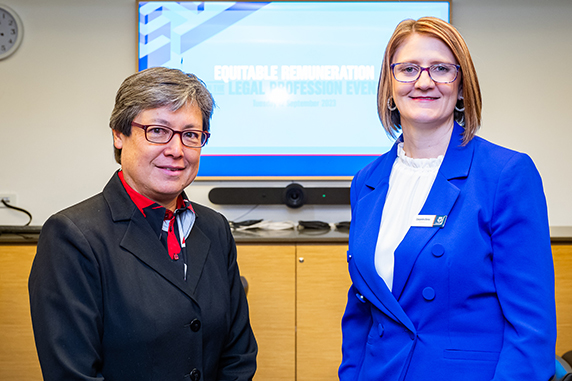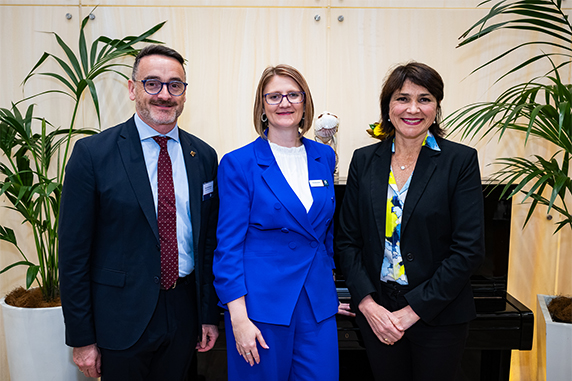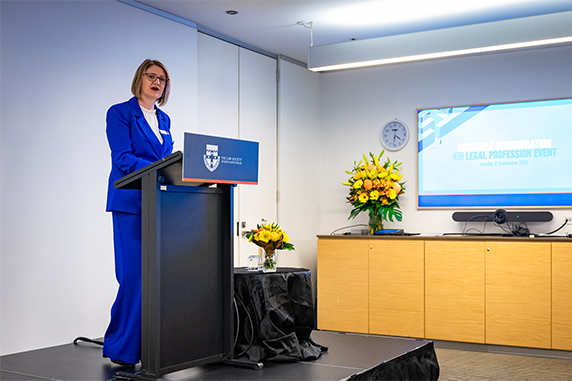It is clear that as a profession, we need to maintain a focus on this work, including gender equality, as a matter of priority. Equitable remuneration will not be achieved without commitment and deliberate actions across the profession.
Australia’s new sex discrimination commissioner says the NSW legal profession must improve its collection and analysis of data on renumeration to appropriately address the gender pay gap and lack of diversity across the board.
Dr Anna Cody, who began her five-year term this month, delivered a keynote speech on Tuesday night to the Law Society of NSW’s launch of its new guidance document to tackle persistent pay gaps, after two consecutive years of profession-wide studies revealed inequality exists across the entire career cycle.
The resource, Equitable Renumeration in the legal profession, is a 10-point plan for law firms and follows up on commitments by the current and previous presidents of the Law Society.
Cody, who has held a practising certificate since 1993, told a room of solicitors and esteemed guests including lawyer and former Matildas player Moya Dodd, that unless firms start accurately measuring and reporting their renumeration data, the problem will remain.
“Improving the data we collect is key to addressing the gender pay gap. Unless we actually measure what is happening, we won’t be able to change it. It’s also essential to adopt an intersectional approach to ensure that leadership and pay equity for all marginalised communities is achieved,” Cody said.
“This is important because there are fundamental gaps in knowledge regarding the experience of Aboriginal and Torres Strait Islander solicitors, solicitors with disability, LGBTIQ+ solicitors, or those from culturally and racially marginalised backgrounds.
“In NSW, we know that 0.9 per cent of all solicitors are Aboriginal and/or Torres Strait Islander, out of a population representation of 3.4 per cent. However, beyond these statistics we don’t have clear and sufficient data to understand the experiences of this cohort and how we can improve leadership in that area.”
The guidance document also encourages firms to examine billing structures, increase pay transparency, ensure flexible working arrangements don’t negatively impact women’s advancement and have a robust lateral recruitment strategy.
The 2022 Annual Profile of Solicitors in NSW, published in 2023, revealed for the third year in a row that nine per cent fewer women than men in the profession earn more than $150,000. 54 per cent of all practising solicitors are women and despite making up 69 per cent of solicitors in the government legal sector, and 62 per cent in the corporate sector, they continue to be underrepresented in positions of leadership.
“What Annual Profile has indicated was having women present in the legal system is not enough to ensure equitable renumeration. We used to think that once women graduated in sufficient numbers, that equality would occur as just making sense,” Cody said.
The NSW profession achieved gender balance in 2016 and since then women have made up the majority of the solicitors in the state. But 2023 President of the Law Society Cassandra Banks said this “numerical advantage” hasn’t translated to equal pay. This prompted the Law Society to work with signatories to the Charter for the Advancement of Women and other leading firms to develop the resource.
 Cassandra Banks, 2023 President of the Law Law Society of NSW
Cassandra Banks, 2023 President of the Law Law Society of NSW
Banks emphasised many firms and legal practices across NSW have already been doing important work to embed diversity and inclusion in their operations.
“These practices know the benefits of supporting all their talent. However, it is clear that as a profession, we need to maintain a focus on this work, including gender equality, as a matter of priority. Equitable remuneration will not be achieved without commitment and deliberate actions across the profession,” Banks told the launch event.
“I’m confident this resource will provide practice leaders with useful tools to enable them to develop and encourage their legal talent while taking advantage of the value and business imperative that gender equal workplaces represent.”
Creating a gender action plan or strategy with clear targets is also important for firms to prioritise to address equality, Cody said.
Echoing the Law Society’s guidance document, Cody recommended action plans include an examination of the causes of the lack of diversity, as well as changing the criteria for leadership positions.
“I reiterate the Law Society’s emphasis on the importance of anchoring gender equality and diversity as a priority for all firms through the implementation of practical action plans or strategies. This requires firms to have specific goals,” she said.
“This call for action mirrors recent amendments made to the sex discrimination act, to introduce a positive duty on employers to prevent workplace sexual harassment and sex-based discrimination.
“That is an addition to amendments made to the workplace gender equality act which will also expand employer reporting requirements on prevention and response to sexual harassment, harassment on the ground of sex and discrimination in the workplace.”
From 2024, it will be mandatory to report on employer workplace policies and strategies on sexual harassment, including accountabilities for preventing and responding, providing training, the frequency of that training and its contents, leadership statement or communication to demonstrate a commitment to preventing these incidents.
“We know that a lack of gender and pay equity and a lack of diversity is one of the causes of unsafe workplaces. Experiences of workplace sexual harassment can be one of the most damaging barriers to career success, progression and job satisfaction for women and gender diverse people,” Cody said.
Main picture: 2023 President of the Law Society of NSW with Australia’s sex discrimination commissioner Anna Cody.








